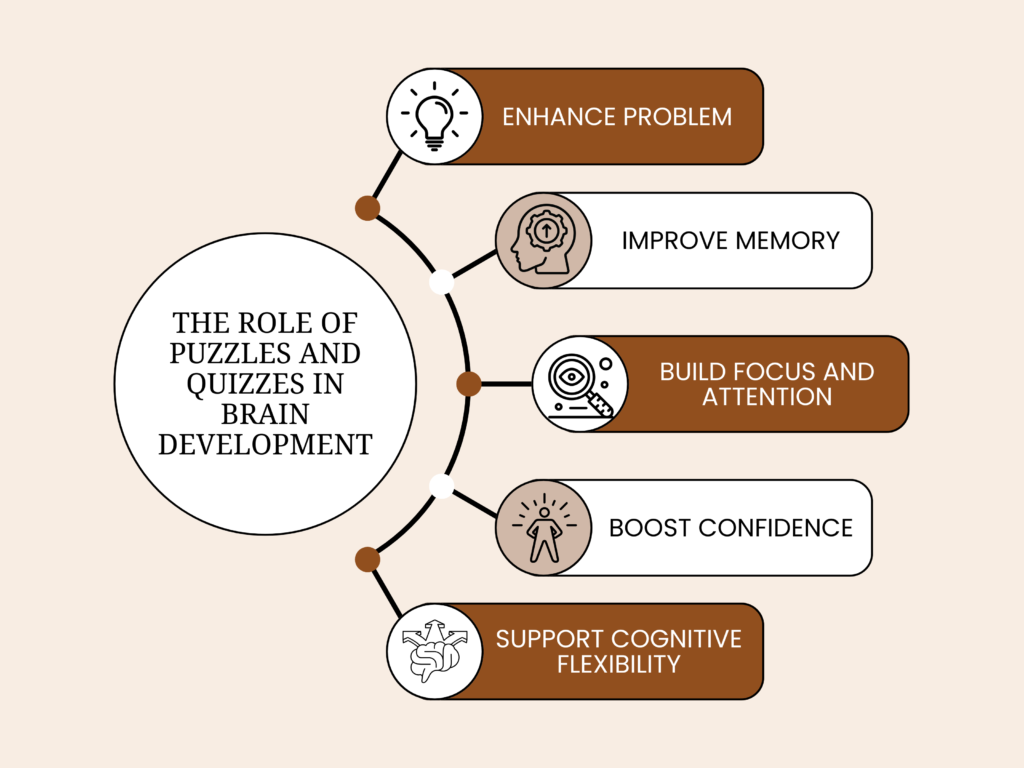Table of Contents
Brain development is a continuous and dynamic process, especially during the early years of life. During this time, the brain undergoes rapid growth, making it highly receptive to various forms of stimulation. One of the most engaging and effective ways to nurture this growth is through activities like puzzles and quizzes. These simple yet powerful tools not only entertain but also play a vital role in brain development, particularly in early childhood. In this blog post, we will explore how puzzles and quizzes contribute to brain growth and how they can be integrated into daily activities for maximum benefit.
The Early Stages of Brain Development
In the first few years of life, a child’s brain forms connections at an incredible rate. These connections, known as synapses, are the foundation for learning, memory, and cognitive development. As children engage with their environment, they make new neural connections that enhance their understanding of the world. This is where puzzles and quizzes come into play. By challenging the brain to think critically, solve problems, and make decisions, these activities help strengthen the neural pathways that are crucial for cognitive abilities.
Puzzles: A Gateway to Cognitive Growth
Puzzles are often one of the first problem-solving activities that children engage with. Whether it’s a simple jigsaw puzzle, a maze, or a shape-matching game, puzzles encourage children to use both their logical and creative thinking skills. As children manipulate pieces, they develop spatial reasoning, hand-eye coordination, and an understanding of cause-and-effect relationships. These skills are essential for later cognitive abilities, such as math, science, and even language acquisition.
Problem-Solving Skills
When solving a puzzle, a child must assess the pieces, visualize how they fit together, and test their assumptions. This process of trial and error strengthens critical thinking skills and teaches persistence. Moreover, it enhances their ability to plan and organize, skills that are vital not only in academic settings but in everyday decision-making and social interactions.
Memory and Focus
Working with puzzles also enhances memory. Children often need to recall where specific pieces go and remember the sequence of steps required to complete the puzzle. This repetitive practice of remembering and recalling details strengthens both short-term and long-term memory, which plays a significant role in all aspects of learning.
Attention to Detail
Puzzles also encourage attention to detail. By observing patterns, shapes, and colors, children fine-tune their ability to notice finer details, which is critical for various learning processes, from reading comprehension to scientific observation.
Quizzes: The Power of Testing and Reinforcement
Quizzes, on the other hand, provide a different but equally valuable kind of stimulation for brain development. They offer an opportunity for active recall, which is a powerful learning technique that involves retrieving information from memory. When children take quizzes, they are forced to remember facts, analyze situations, and apply their knowledge in different contexts.
Active Learning and Retention
Quizzes can significantly improve retention rates. When children answer questions, especially in a timed setting, they activate their brain’s recall processes. This strengthens memory retention and builds connections between different pieces of knowledge. It also allows for instant feedback, where children can learn from their mistakes and reinforce the correct information.
Boosting Self-Confidence and Motivation
Successfully answering quiz questions boosts a child’s confidence, reinforcing a sense of accomplishment. Quizzes also encourage a growth mindset by showing children that improvement is possible with practice. This builds motivation and instills the belief that their abilities can be developed over time.
Language and Cognitive Flexibility
Quizzes often involve a range of topics, which helps improve vocabulary, comprehension, and cognitive flexibility. By answering questions on various subjects, children learn to adapt their thinking, understand different contexts, and expand their cognitive horizons.
How to Integrate Puzzles and Quizzes into Daily Activities
Incorporating puzzles and quizzes into daily life doesn’t require much effort. You can easily make these activities a part of your child’s routine without overwhelming them. Here are some tips:
- Puzzle Time: Set aside time each day for puzzle-solving. Start with age-appropriate puzzles and gradually increase the difficulty level as your child’s skills improve.
- Quiz Sessions: Organize fun quiz sessions where children answer questions based on the topics they are learning. Use flashcards, trivia games, or online quiz platforms for variety.
- Interactive Digital Quizzes: Utilize apps and websites like Cogsnita to engage children with quizzes that stimulate their cognitive growth. These platforms often feature puzzles and quizzes specifically designed to enhance brain development.
- Combine with Storytelling: Create quizzes based on stories or experiences. This helps children retain information while developing their storytelling and creative skills.

Conclusion
The role of puzzles and quizzes in brain development cannot be overstated. These activities support the growth of crucial cognitive skills like problem-solving, memory, attention, and language. By incorporating them into daily routines, we provide children with the tools they need to strengthen their brains and prepare for lifelong learning.
So, whether it’s a jigsaw puzzle that encourages spatial reasoning or a fun quiz that enhances memory retention, both are essential for the developing mind. Make time for these brain-building activities, and watch as your child’s cognitive abilities flourish.
Resources:
- Cogsnita – Engage in quizzes and puzzles designed for brain development.
- The Benefits of Brain Exercises – Learn more about how different exercises boost brain growth.
